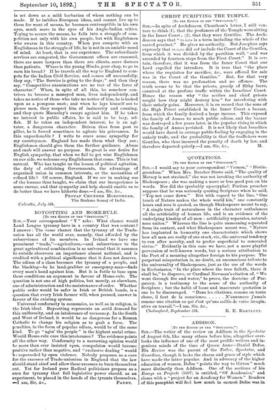QUOTATIONS.
Pro THE EDITOR OF THE "SPECTATOR."] SIR,—I would say to your correspondent " Vernon," " Distin- guendum." When Mrs. Beecher Stowe said, " The quality of Mersey is not strained," she was not invoking the authority of Shakespeare ; she was making a more or less good pun on his words. Nor did the (probably apocryphal) Puritan preacher suppose that he was seriously quoting Scripture when he said, " Top not come down." But with regard to the line, " One touch of Nature makes the whole world kin," one constantly hears and sees it quoted, as though Shakespeare meant to say, " A single trait of naturalness in the character outbalances all the artificiality of human life, and is an evidence of the underlying kinship of all men : artificiality separates, natural- ness unites." Whereas the line is quite unmeaning separated from its context, and what Shakespeare meant was, " Nature has implanted in humanity one characteristic which shows how all men are really of one stock, viz., the universal tendency to run after novelty, and to prefer superficial to concealed virtue." Evidently in this case we have, not a mere playful perversion of well-known words, but a serious attribution to the Poet of a meaning altogether foreign to his purpose. The perpetual misquotation is, no doubt, an unconscious tribute to the universality of Shakespeare, just as the use of the words in Ecclesiastes, "In the place where the tree falleth, there it shall be," to disprove, or Cardinal Newman's citation of, " We went through fire and water," to prove, the doctrine of Pur- gatory, is a testimony to the sense of the authority of Scripture ; but the habit of loose and inaccurate quotation is one to be discouraged. " Dans les citations, comme en toute chose, it fant de la conscience N'annoncez j'amais comme une citation ce qui r'est qu'une saillie de votre ative en travail."—I am, Sir, (Ice.,


































 Previous page
Previous page